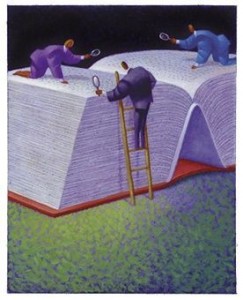
Bad reviews are a huge topic of discussion in the indie/self-published author forums. Sometimes it feels like a good half of all discussion board threads are dedicated to it. Of course, there are good reasons for this. They’re a big deal. Yep, they are. Plus, every new author has to go through the same harrowing experience of getting their first one or two or few and it helps a lot to have like-minded others to bounce it off of.
Sometimes these authors want to be told the reviewer is out of line. It’s a Band-Aid to the ego. Sometimes they want to have the points made by the reviewer confirmed to allow future growth. Sometimes they just need to hear, ‘Hey, yeah, I’ve been there. Sucks huh?” Camaraderie goes a long way.
I was there a year and a half ago, when I published The Weeping Empress. Academically, I knew I would get bad reviews. Theoretically, I understood that everyone likes different things and there was no realistic way to please everyone. I’d even emotionally armoured myself against any possibility of mean spirited, troll-like bullies who take a perverse joy in throwing literary bombshells at new authors. Honestly, I don’t think TWE has come to the attention of one of these yet, but I was prepared. Despite all of my mental gymnastics, I didn’t really understand the whole bad review situation, not really.
In then end, I was jejune. All I understood was that at some point I would be embarrassed because someone somewhere would think me unworthy of having published a book. This is an especially hard lump for self-published authors to swallow since they don’t have the inherent affirmation of being accepted by a publisher before presenting said book to the public. It’s a little niggling fear in the back of our heads at almost all times. But there is so much more to the question of how to mentally navigate receiving a bad review than whether you allow yourself the luxury of embarrassment or not.
Which brings me to why I’m writing this post today. I’m not claiming any expertise. I’m not even sure what would provide a person with enough experience to make such a claim, but I have two avenues of important observations that makes me qualified to write this post. One is being a self published author with a book on the market that has received rave and revolting reviews. Another is as a reader and reviewer who has written hundreds and hundred of reviews of indie and self published works. I’m looking at this topic from both directions and I’m still seeing a lot of new authors who just don’t get it yet. (The yet is important, because I think anyone who plays the field long enough does eventually.) I’m hoping this post helps a little.
I had two experiences within days of each other that brought this post to mind at this point in time. The first is that TWE just received a zinger of a review.* It now has the honour of being one man’s, who’s written 280 some odd reviews, ONLY one star review. Ouch. Like a rather hardened writer, I read it, frowned a little, shrugged and moved on. It doesn’t deserve any more of my attention than that. But it left bad reviews on the mind.
Second, I posted a review on Amazon and noticed that the rating stats of the book in question looked like this:
- 5 star: 45
- 4 star: 11
- 3 star: 2
- 1 star: 1
I’m not claiming that there is anything hinky going on with this book or its author. Even if, out of curiosity, I did click on the first three 5 star reviews only to find each reviewer gave every book they read 5 stars. Or even though there were six comments following the lone 1 star review condemning her for her opinion.
But I’m pointing out that I noticed these things because it highlights the point I’m going to eventually make with this post. So many good reviews with no bad ones looks suspicious, even if nothing suspicion-worthy is going on. Bad reviews lend credibility to a book’s good reviews.
Readers of Indie and Self Published books are a savvy bunch and they’ve learned what a sock puppet looks like. They’ve considered that authors have friends who will boost their rating for them. They’ve seen the advertisements that guarantee 5 reviews for $90. They now go into the market suspicious, so it takes very little to raise their eyebrows. And more than a few are willing to write off an author because they think he or she is cheating the system. Can you blame them? If an author has so little faith in their own work that they need to pad their numbers, how good can the writing be?
What they may not know, or know and give less credence to, is that reviews (good, bad or otherwise) are hard to come by. Sometimes authors really aren’t trying to cheat. They’re just trying to compete. I get that. But readers really don’t have any obligation to consider all sides of an issue. They have every right to pass a book up for any reason they choose.
While I think that’s the most important point here, there are a number of other reasons that bad reviews are good for a book. Bad reviews prevent further bad reviews. It’s counterintuitive, I know. But it’s true. Yes, a bad review may dampen sales a bit. But think about who’s passing the book up.
If you gathered 45 likeminded people in a room, you still wouldn’t get 45 identical preferences (part of why the above stats looks so suspicious). It stands to reason that some readers won’t like a book. If that’s the case wouldn’t it be better for the author that that particular person not pick it up in the first place? So, those readers similar to the writer of the bad review will by-pass the book and therefore not review it.
Contrarily, those to whom the review doesn’t resonate, who like the same things the reviewer disparaged are just as likely to pick the book up as a result. It’s true, sometimes a bad review can even encourage people to read a book. If the previous point was counter-intuitive, what should I call this point? If the issues the reviewer chooses to highlight happen to pique another’s interest, it can encourage them to read a book. This is especially true if the subject in question is a little on the controversial side to start with. I’ve also, more than once, read a book just to see if it’s a bad as people say. Curiosity is a curious beast and you really never know what might cause someone to scratch that itch.
Lastly, No reviews can often be more damaging to a book than a poor review or two. Even if someone didn’t like a book, it’s still been read by someone, thereby proving itself readable. Books with no reviews don’t have this benefit. There are no quality gatekeepers to the self-published or indie marketplace. New authors are complete unknowns to a reader and many times readers will choose not to take a chance on a book that doesn’t have at least one person who claims to have read it.
I’ve left out bad reviews are amazing learning tools for authors because I really wanted this to be about how poor reviews can benefit a book’s sales or likelihood of being read. But the list really wouldn’t be complete if I didn’t include this one. As hard as bad reviews are to read, they can be chocked full of tips on how to improve future writing.
Of course, I have to concede that many of these points are dependent on the bad review being centred on a reader not liking a book or some aspect of a book. There is very little that can be gained by a review that says horribly written, badly edited, and atrociously formatted. The only benefit of such a review that I can think of is that an author knows to pull the product and start again.
I believe there is a process to learning to truly accept criticism and bad reviews as part of the writing and publishing process. It starts with the difficult and personal need to harden oneself to the harsh words of strangers, moves to being able to let such comments flow past without cringing (too much) or even not looking for them at all, then eventually comes to the point when a writer is able to look at the most vitriolic review as still beneficial to their end-goal. This is the point when those more advanced in the process can help those newer to publication. This might even be when people can let themselves think of their-selves in terms of an author instead of a writer.
I’d be more than a little interested in hearing other’s thoughts on this subject. There are thousands of new authors out there, just starting this journey and it’d be nice to hear from people at all points in the process.


